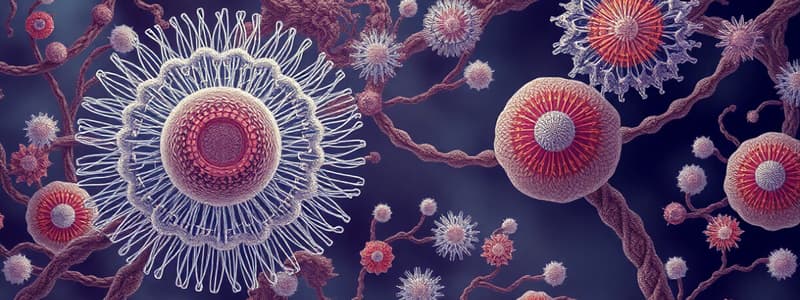Podcast
Questions and Answers
What are organisms primarily made up of?
What are organisms primarily made up of?
- Tissues
- Organs
- Cells (correct)
- Molecules
Which term refers to a group of organs working together to perform specific functions?
Which term refers to a group of organs working together to perform specific functions?
- Tissue
- Cell
- System (correct)
- Organism
In the hierarchy of biological organization, which comes directly after the cell level?
In the hierarchy of biological organization, which comes directly after the cell level?
- Organ
- Tissue (correct)
- Community
- Organism
What is the primary function of organs within an organism?
What is the primary function of organs within an organism?
What encompasses both organs and the systems they form?
What encompasses both organs and the systems they form?
What is the main focus of the study of life according to the provided content?
What is the main focus of the study of life according to the provided content?
Which aspect is emphasized as NOT being an alternative to the textbook?
Which aspect is emphasized as NOT being an alternative to the textbook?
What concept is implied to be essential in the study of biology in the content provided?
What concept is implied to be essential in the study of biology in the content provided?
How can the study of life be categorized based on the provided information?
How can the study of life be categorized based on the provided information?
Which of the following statements best describes the hierarchy in biological organization?
Which of the following statements best describes the hierarchy in biological organization?
What type of cell has a nucleus that is membrane-bound?
What type of cell has a nucleus that is membrane-bound?
Which of the following organelles is present in eukaryotic cells but absent in prokaryotic cells?
Which of the following organelles is present in eukaryotic cells but absent in prokaryotic cells?
What is the typical structure of prokaryotic cells in terms of their chromosomes?
What is the typical structure of prokaryotic cells in terms of their chromosomes?
In terms of cell type, which characteristic is true for eukaryotic cells?
In terms of cell type, which characteristic is true for eukaryotic cells?
Which of the following examples is correctly categorized as eukaryotic?
Which of the following examples is correctly categorized as eukaryotic?
Flashcards are hidden until you start studying
Study Notes
Levels of Biological Organization
- The study of life has a hierarchy of organization.
- Organisms are comprised of organs and organ systems.
- Organisms, organs and organ systems are made up of cells.
Eukaryotic vs Prokaryotic Cells
- Both types of cells share DNA as their genetic material.
- Both types of cells have ribosomes.
- Eukaryotic cells have a nucleus, membrane-bound organelles, and are usually multicellular.
- Prokaryotic cells have no nucleus, do not have membrane-bound organelles, and are usually unicellular.
- Eukaryotic cells have larger ribosomes than prokaryotic cells.
- Eukaryotic cells have more than one chromosome.
- Eukaryotic cells are found in animals and plants, prokaryotic cells are found in bacteria and archaea.
- Eukaryotic cells have mitochondria, prokaryotic cells do not.
- Eukaryotic cells have a Golgi apparatus, prokaryotic cells do not.
Nutrient Cycling
- Nutrients are cycled through the environment.
- Plants acquire nutrients from the soil, which eventually return to the soil.
Taxonomy
- Taxonomy is the branch of biology that names and classifies species.
Studying That Suits You
Use AI to generate personalized quizzes and flashcards to suit your learning preferences.




